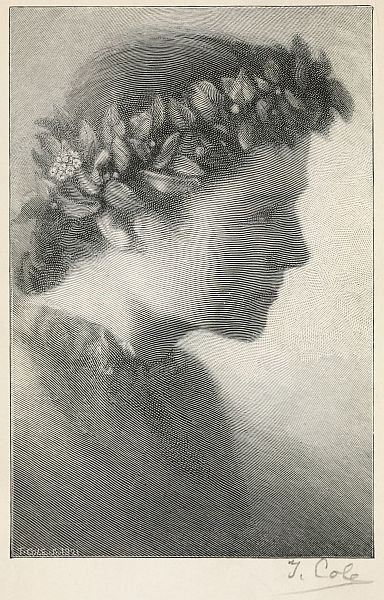LOUISE IMOGEN GUINEY


BY
New York
THE MACMILLAN COMPANY
1921
All rights reserved
Copyright, 1921,
By NORTH AMERICAN REVIEW CORPORATION.
——————
Copyright, 1921,
By THE MACMILLAN COMPANY.
Set up and electrotyped. Published September, 1921.
Press of
J. J. Little & Ives Company
New York, U. S. A.
LOUISE IMOGEN GUINEY
A STUDY
It is, she says, “a stone-built paradise ofa village not far from Oxford. There is anApril wind blowing, and forty-three rosesadorn one cottage doorway just out of sightfrom here. The old collie and I had a walkyesterday, and I dipped my stick in Shakespeare’sAvon at Fledbury.”
This was the woman, yet not muchchanged in high intent and gayest vagabondagefrom the girl New England—and, indeed,[2]this western world—uniquely loved.Still, to us, is she a figure of bright beginningsand the swiftest road to her is thatbackward pathway to her youth.
Her father, General Patrick RobertGuiney, a soldier of the Civil War, was herexemplar and her adoration, and his deathan overwhelming grief. “My preux chevalierof a father,” she was proud to call him,in a quick flaming up of passionate remembrance.Though he died in her girlhood—anddied of his wound, as it fed her ardentsoul to remember—she never ceased to feela living allegiance to him. Her plastic innerlife had been molded by him, the pictureher mind made of him touched into enduringcolors by the manner of his death. Therewas between them that “marriage of trueminds” which is more lastingly productivethan the tie of blood, and she was proud ifyou could trace in her the reflex of thosequalities she held highest in him: his activepatriotism, his slack hold on life, if it couldbe nobly given, and a tenacity of devotionto the brave fight. Of her remoter background[3]she says, with a pleasing touch ofswagger, a slightest waving of the plume:
“My grandfather and great gran’, too,were ‘out’ in the ’98; and the old man hadbeen ‘out’ in the ’45. I hope to make hisacquaintance in the sojer-boy’s Paradise,which is my bourne, if I be good.”
In one of her earliest essays, “A Child inCamp,” she makes her bow thus, with apretty grace:
“Like the royal personages in the drama,I was ushered on